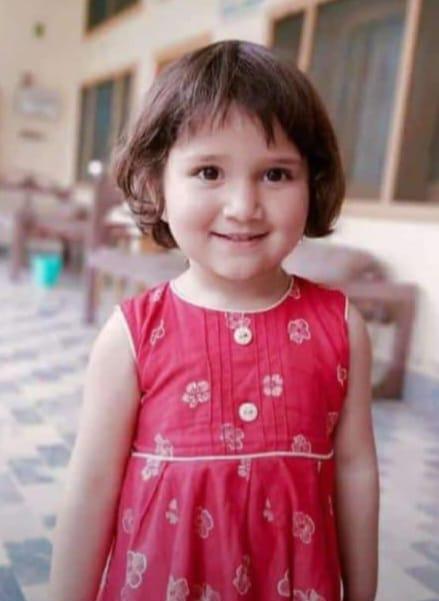
Presentation Sisters are pictured May 24 with students who survived a gun attack May 16 at Sangota Public School in Swat Valley, Pakistan. Classes resumed May 24 when the students recited prayer in the morning assembly. A sign behind them reads "Welcome back." (Courtesy of Sr. Teresa Younas)
Sr. Teresa Younas was in her office on May 16 when she heard gunshots in the compound of Sangota Public School in the scenic northwestern Swat Valley, Pakistan. The Sister of the Presentation of the Blessed Virgin mourns for Ayesha Abid, a 9-year-old student who died from a head wound she sustained while sitting in the backseat of her school van.
"She was among the new admissions this March," Younas said. "I tried to console the panicked children. The parents and locals helped us in rushing them to the nearby hospital."
"A ninth grader from another school also died. She was having her annual exams at our campus. Similarly a visiting teacher was also injured. I apologized to the grieving parents but they know we were helpless."
Younas, the school principal, and her fellow nuns spent that afternoon at the hospital visiting the five injured students and giving statements to the inquiring police officers. No classes were held at the missionary school following the shooting. However grade nine and 10 students kept visiting the school under tight security to take board examinations.

Swat Valley District Police Officer Shafiullah Gandapur, right, visits the students of Sangota Public School at a hospital on May 16. (Courtesy of Sr. Teresa Younas)
According to police sources, school guard Alam Khan accidentally fired the shots. As UCA News reported, Archbishop Joseph Arshad of Islamabad-Rawalpindi Diocese said that police declared Khan "mentally ill" in their initial statement to the school. Khan is in jail while the investigation is ongoing.
Four surviving students, wearing bandages, joined hundreds of protestors in chanting anti-police slogans on May 17 in Charbagh of Swat Valley. The speakers included civil society members and the father of slain Ayesha Abid.

Ayesha Abid, a nursery grade student, who was killed in an attack on a school van in Swat Valley, Pakistan (Courtesy of Sr. Teresa Younas)
"I am emotional because my heart is broken," he said in tears. "I prayed for my daughter after hearing about the firing. A piece of my heart is no more. My wife has forgiven the shooter but I want justice."
Arshad visited the Presentation Sisters of Swat Valley the same afternoon and held meetings with local police.
"Together with the affected families, we demand justice for our students," he said. "District authorities have been warned against deploying young troops. We need mature protectors cleared both physically and mentally with proper documentation of their background."
Anglican Bishop Humphrey Sarfaraz Peters of Peshawar Diocese, which encompasses the northern Khyber Pakhtunkhwa (or KP) province, announced a minute's silence in all the Christian schools that morning.
"This is the height of brutality and a heinous crime," Peters said in a press release. "Kindly do remember the families of the shaheed (martyred) innocent little daughters and also pray for the injured ones for a speedy recovery. May Almighty God have mercy on our country."

Presentation Sisters and the police investigation team are pictured with the attacked school van of Sangota Public School in Swat Valley, Pakistan. (Courtesy of Sr. Teresa Younas)
The Human Rights Commission of Pakistan demanded formation of a special investigation team to bring the perpetrator to swift justice.
"The horrific death of a young schoolgirl after a police constable opened fire in a school in Swat, injuring seven others, is a grim reminder of how vulnerable the young remain to wanton violence, especially in KP where the state has failed to protect law and order," it stated.
The government of Khyber Pakhtunkhwa Home and Tribal Affairs Department has initiated a review of the security profile of personnel.
A new team of 24 policemen and women now guards the school where a clinical psychologist held weeklong workshops with the teachers and employees. The bullet-riddled blue van has been removed from the school compound following a request from the sisters in charge.

The morning assembly, held May 24 at Sangota Public School (Courtesy of Sr. Teresa Younas)
Regular classes resumed on May 24 when the students recited prayer in the morning assembly without any mentioning of the tragedy. "Welcome back," stated a paper cutting pasted on a blue curtain decorated with golden stars and multicolored balloons on the school stage.
"We reopened our school with great courage and trust in God's providence," Younas said. "The survivors, including Ayesha's sister, were back to resume their education. Salute to their parents."
Built in 1962, the Catholic school, popularly called Sangota Public School, is renowned for imparting quality education in the Malakand region of KP province bordering Afghanistan. Most of its 1,060 students are Muslim.

Sr. Teresa Younas, right, addresses students at Sangota Public School on May 24. Courtesy of Sr. Teresa Younas)
In 2008, the Taliban bombed the only Catholic school in Swat Valley district, for providing Western education to girls and for acting as a center of Christianity. A Muslim village elder rescued the Apostolic Carmel sisters, who were managing the Sangota School at that time, and drove them to Peshawar, the provincial capital in his car. The school reopened in 2012 after the Pakistan army rebuilt the institute, located on a hill.
Last year, unidentified armed men opened fire on a school van of 15 students outside the Knowledge City School in the Guli Bagh locality of Swat, killing the driver and injuring a child.
Nobel Peace Prize laureate Malala Yousafzai was also shot in the head in 2012 in Swat over her advocacy for girls' education and opposition to Islamist militancy.
The Taliban took over much of the valley starting in 2007, banning girls' education, killing people, flogging women and hanging bodies from electric poles to enforce their harsh interpretation of Islamic law before the Pakistani army drove them out in 2009.
Advertisement
Violence in Swat Valley is the deadliest since twin suicide bombings at Peshawar's All Saints Church that killed 81 worshippers and injured more than 120. The attack in 2013 was the worst strike on the minority Christians in Pakistan.
Every parish in Peshawar has had a police post since the church bombing. The provincial government deploys at least three police guards at the gate of every church institute. In return, the church provides them free electricity and gas stoves for cooking and heating in winters.
Last year, a Church of Pakistan pastor in Peshawar was shot dead. Another pastor, who survived the assassination, was moved to Hyderabad dioceses in southern Sindh province.
Fr. Nasir William, director of the Diocesan Commission for Rawalpindi and Islamabad is now afraid of going out with his police guards.
"A district police officer once confessed that those who fail on duty at posts, unable to work at police stations or get suspended are stationed at churches. Their duties are changed after every three months without informing us. Instead of being vigilant, they usually sit at the gate, sometimes keeping it open late at night. How can we trust them?"





